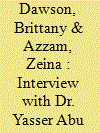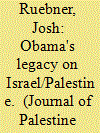|
|
|
Sort Order |
|
|
|
Items / Page
|
|
|
|
|
|
|
| Srl | Item |
| 1 |
ID:
144595


|
|
|
|
|
| Summary/Abstract |
This October 2015 interview with director of the Gaza Community Mental Health Programme (GCMHP) Dr. Yasser Abu Jamei addresses how mental health professionals care for themselves and each other in an environment with little break from sustained conflict. Mental health workers in the Gaza Strip must cope with the resource shortage generated by the Israeli blockade and their own trauma while aiding others. The United Nations Children's Emergency Fund (UNICEF) estimates that over one-third of Gaza's children require direct and specialized psychosocial support as a result of Israel's Operation Protective Edge (OPE), the fifty-day war on Gaza in the summer of 2014, and earlier assaults. GCMHP provides services free of charge at clinics, community centers, and by phone via a twenty-four-hour hotline, and since its founding, has served more than twenty thousand Gazans with capacity-building programs and trainings, community education, scientific research, and human rights advocacy. GCMHP provided mental health support to the community both during and after each of the three large-scale Israeli assaults on Gaza (in 2008, 2012, and 2014), helping the community to work through both collective and individual trauma. Over twenty-one hundred Palestinians, five hundred of them children, were killed during OPE and another eleven thousand injured. During OPE an airstrike killed twenty-eight members of Abu Jamei's extended family, including nineteen children, as they broke their Ramadan fast. It was the largest loss of life within a single family at that point in the war. The structural damage was similarly catastrophic, leaving over one hundred thousand Gazans homeless. Long after the cease-fire, the psychological wounds sustained during consecutive assaults continue to disrupt everyday life.
|
|
|
|
|
|
|
|
|
|
|
|
|
|
|
|
| 2 |
ID:
148605


|
|
|
|
|
| Summary/Abstract |
This retrospective assessment argues that despite the arrival in office in 2009 of a president who articulated the case for Palestinian rights more strongly and eloquently than any of his predecessors, U.S. official policy in the Obama years skewed heavily in favor of Israel. While a negotiated two-state resolution of the conflict between Israel and the Palestinians continued to be the formal goal of the United States, Israel's defiant refusal to stop settlement expansion, the administration's determined actions to perpetuate Israeli impunity in international fora, as well as the U.S. taxpayer's hefty subsidy of the Israeli military machine all ensured that no progress could be made on that score. The author predicts that with all hopes of a negotiated two-state solution now shattered, Obama's successor will have to contend with an entirely new paradigm, thanks in no small part to the gathering momentum of the Boycott, Divestment and Sanctions (BDS) movement.
|
|
|
|
|
|
|
|
|
|
|
|
|
|
|
|
|
|
|
|
|